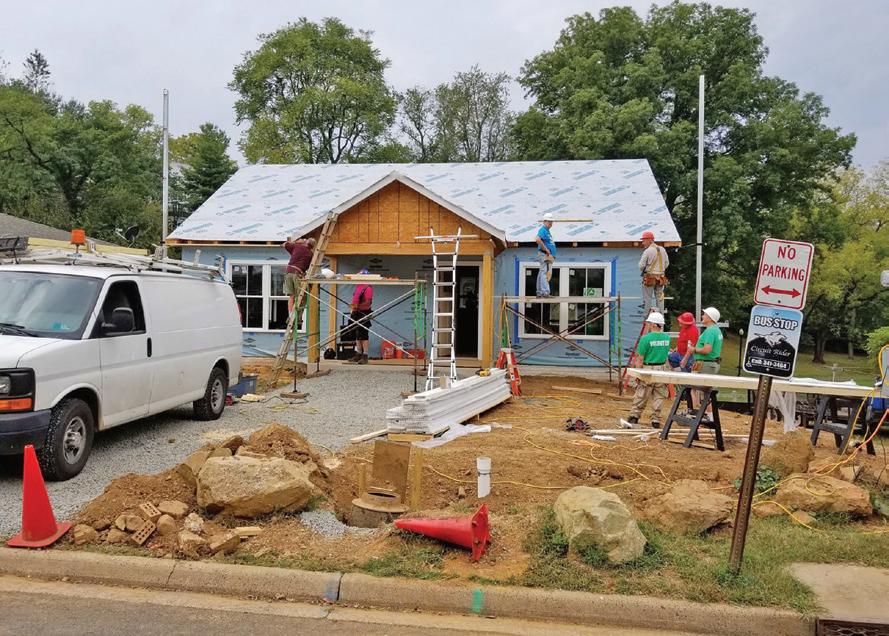
4 minute read
Melanie Burch Having Huge Habitat Impact
Melanie Burch Having Huge Habitat Impact
By Emma Boyce


When Melanie Burch took over as president and CEO of Fauquier Habitat for Humanity in 2023, the need for housing in Fauquier County far surpassed the one or two homes the nationwide non-profit produced in a year. Seeing the alarming rise in homelessness and the lack of affordable housing for Fauquier’s workforce, Melanie has fought to change the status quo.
“In order to start making a dent in this whole process it’s not going to be the old traditional way of fundraising,” said Melanie, who first joined Habitat in 2019 as director of engagement, major gifts and planned giving. “While having a bunch of volunteers coming out and building one house at a time is wonderful, it doesn’t necessarily work to the benefit of those who are in need.”
With the support of the board of directors, including Chairman Charles Robinson, she has utilized state and federal funding to begin creating more housing opportunities in Fauquier, providing not only shelter but an avenue for those in need to build generational wealth.
“Melanie Burch is the third CEO since I’ve joined the board,” said Robinson, a member since 2018. “From where I sit, the board’s job is to lay out the vision and it’s the job of Melanie and her team to carry out that vision. The fact that we’re going to build eight new houses this year alone says all that anyone needs to know (about her).”
In January, the town of Warrenton granted Fauquier Habitat $250,000 to help build 13 new homes on Haiti Street within the next two years. Along with the ARPA funding, Habitat has also received a $300,000 grant from the RappahannockRapidan Regional Commission, $700,000 from the Virginia Department of Housing and Community Development, and a $1.5 million loan from Habitat capital CDFI funds.
“We have to be creative.” Melanie said. “We have to build homes that are a good size, that are safe and effective but also affordable.”
Each Habitat home is built with the homeowner in mind, opting for sustainable and energy efficient materials over cheaper alternatives.
“We invest in a lot of new technology,” Melanie said. “We use materials that are not going to fall apart within the next 30 to 40 years. We also have a grant to put solar panels on the majority of our homes, so we’re trying as best as we can to create that net zero home.”
New homeowners are also required to take classes. Fauquier Habitat offers instruction on finances, house maintenance, and how to be a good neighbor, among others. By the end of the instruction, homeowners have the basic plumbing and electrical knowledge to handle every day issues.
“The other major difference is that Fauquier Habitat was one of the first to help put together the Virginia Statewide Community Land Trust,” Melanie said. “We now take the land out of the cost of the sale and put that into permanent easement. That easement is there in perpetuity.”
A land trust ensures that Habitat homes cannot be sold at market value and will remain for people in need.
Looking ahead, Melanie also plans to turn a Habitat-owned building on 35 Horner Street into either 18 condos or 18 apartments.
“If we can build these 18 units, it’s 18 more opportunities for people who work in our area to come back and live here,” she said. “It is beyond difficult for the majority of people to come back into our county and survive. If they’re lucky to get back in, they’re paying upwards of 50 to 60 to 70 percent of their net income on housing.”
Despite Fauquier Habitat’s ambitious projects, Melanie and Charles Robinson both emphasize the dire housing situation in Fauquier County. The current reality is bleak. Prices continue to climb. Essential workers cannot find decent places to live in the community they serve and are forced to commute. Shelters are full. People are living out of motels for months, sometimes years.
Warned Melanie Burch, “If we don’t hurry up and talk about making creative zoning changes and planning changes to our service districts, we’re going to continue to slide downhill and our homeless population is going to continue to skyrocket.”










